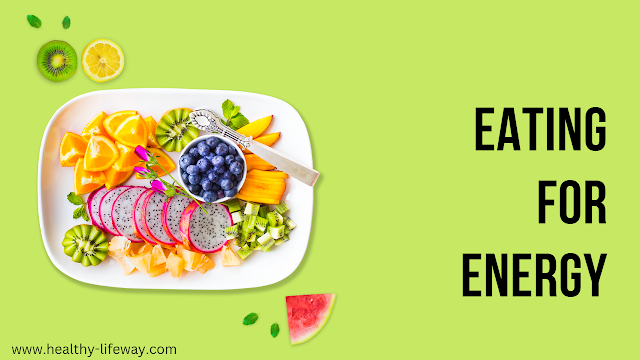Eating for Energy
 |
| Eating for Energy |
Eating for Energy
Nutritional Tips to Boost Workout Performance
Introduction:
Proper nutrition plays a crucial role in achieving optimal workout performance. Just like a well-fueled car, our bodies require the right nutrients to function at their best during exercise. In this article, we will explore some valuable nutritional tips that can help boost your workout performance and enhance your overall energy levels. By incorporating these tips into your routine, you can take your fitness journey to new heights.
Pre-Workout Fuel:
One of the key elements in optimizing workout performance is consuming a well-balanced meal or snack before exercising. Focus on incorporating complex carbohydrates, such as whole grains, fruits, and vegetables, which provide a steady release of energy. Pair these carbohydrates with a source of lean protein, such as chicken or tofu, to support muscle repair and growth. Additionally, don't forget to stay hydrated by consuming water or a sports drink to maintain fluid balance and prevent dehydration.
Timing is Key:
The timing of your pre-workout meal is crucial. Aim to consume a meal or snack containing carbohydrates and protein about 1-2 hours before your workout. This allows sufficient time for digestion and nutrient absorption, ensuring that your body has the necessary fuel during exercise. If you have less time, opt for a smaller snack that is easily digestible, such as a banana with nut butter or a protein smoothie.
Fuel During Exercise:
For longer workout sessions, especially endurance activities, fueling during exercise can help maintain energy levels and delay fatigue. Consider consuming easily digestible carbohydrates, such as energy gels, sports drinks, or fruit, to provide a quick source of energy. These options replenish glycogen stores and keep you going strong throughout your workout. Experiment with different options to find what works best for your body and preferences.
Hydration Matters:
Dehydration can significantly impact exercise performance and energy levels. Proper hydration is essential before, during, and after your workout. Aim to drink water consistently throughout the day to ensure you start your workout well-hydrated. During exercise, sip on water or a sports drink to replenish lost fluids and electrolytes. After your workout, rehydrate to aid in recovery and restore your body's balance. Remember, the color of your urine can be a good indicator of hydration; aim for a pale yellow color.
Post-Workout Recovery:
Optimizing post-workout nutrition is vital for muscle recovery and replenishing energy stores. Consume a combination of carbohydrates and protein within 30 minutes to an hour after exercising. This helps initiate the muscle repair process and replenishes glycogen stores. A well-balanced post-workout meal could include options such as a chicken and quinoa salad, a protein shake with added fruits, or Greek yogurt with berries and nuts.
Bonus Tips:
Balanced Macronutrients:
In addition to timing and proper hydration, it's essential to maintain a balanced macronutrient intake for overall energy and performance. Include carbohydrates, proteins, and healthy fats in your regular meals and snacks. Carbohydrates are the body's primary source of fuel, proteins aid in muscle repair and growth, and healthy fats provide sustained energy. Find the right balance that works for you, keeping in mind your individual fitness goals and dietary needs.
Quality Snacks:
Snacking can be an excellent way to maintain energy levels throughout the day, especially if you have a busy schedule or participate in multiple workouts. Opt for nutrient-dense snacks like trail mix, Greek yogurt, or a piece of fruit with a handful of nuts. Avoid sugary snacks and processed foods, as they can lead to energy crashes and hinder performance.
Listen to Your Body:
Each person's nutritional needs and tolerances are unique. Pay attention to how your body responds to different foods and adjust accordingly. If certain foods make you feel sluggish or uncomfortable during workouts, consider modifying your choices. Experiment with various nutrient combinations and assess how they impact your energy levels and overall performance. Consulting a registered dietitian can provide personalized guidance tailored to your specific needs.
Supplement Wisely:
While whole foods should be the primary source of nutrients, some individuals may benefit from specific supplements. However, it's important to approach supplementation with caution and seek professional advice. Common supplements for workout performance include creatine, branched-chain amino acids (BCAAs), and caffeine. Consult with a healthcare professional or sports nutritionist to determine if supplements are appropriate for you and to ensure proper usage.
Consistency and Long-Term Lifestyle:
Remember that sustainable results come from consistent, long-term lifestyle choices. A single nutritious meal or a day of eating well won't compensate for an overall poor diet. Focus on adopting healthy eating habits as part of your lifestyle, making gradual improvements and adjustments as you progress. This approach will ensure that you are consistently fueling your body for optimal workout performance and overall well-being.
Conclusion:
Enhancing your workout performance through nutrition is within your reach. By implementing these nutritional tips, you can optimize your energy levels, endurance, and recovery, helping you achieve your fitness goals more effectively. Remember to fuel your body with balanced meals, time your nutrition appropriately, and stay adequately hydrated. Listen to your body, experiment with different strategies, and maintain a consistent and long-term approach to your nutrition and exercise routine. By nourishing your body properly, you'll unlock your full potential and enjoy the benefits of improved workout performance. Start making nutritious choices today and witness the positive impact it has on your fitness journey.







Very informative article.Good Job.👍
ReplyDelete